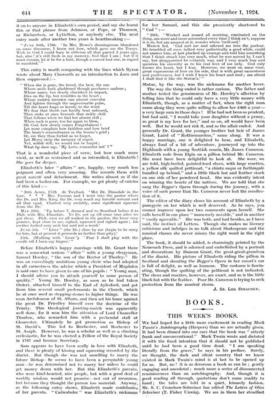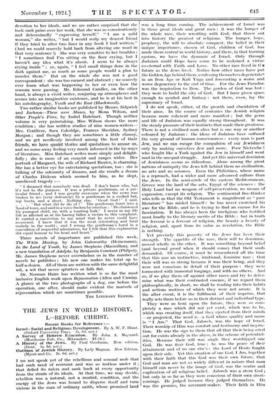B 0 0 K S .
THIS WEEK'S BOOKS.
WE had hoped for a little more excitement in reading Mark Twain's Autobiography (Harpers) than we are actually given. It had been dinned into our ears that the book was " utterly frank and unconventional." Mark Twain wrote and dictated it with the fixed intention that it should not be published until he had been a good time dead. " I .. am speaking literally from the grave," he says in his preface. Surely, we thought, the dark and silent country that we know existed in Mark Twain's mind is at last to be opened up for m. But, no ! it is as decorous a book as can be ; gently engaging and anecdotal ; much more a series of disconnected reminiscences than an autobiography. And, though it is good reading all through, quotations don't come readily to hand ; the tales are told in a quiet, leisurely . fashion. Mr. S. C. Cronshaw-Schreiner has edited The Letters of Olive Schreiner (T. Fisher Unwin). We see in them her steadfast
devotion to her ideals, and we are rather surprised that she took such pains over her work, that she was so conscientiously and determinedly " expressing herself." " I am a mild woman," she writes, " but I would scalp my dearest friend if they tried to alter two lines in any book I had written." (And we could scarcely hold back from altering one word in that very sentence !) She was very sensitive to her troubles : " I sometimes find I'm sitting on the floor crying, but I haven't any idea what it's about. I seem to be always dying inside " ; or, again, " I feel small things done in the dark against me, as much as some people would a plan to murder them." But on the whole she was not a good correspondent : she was too earnest and abstract ; we scarcely ever learn what was happening to her or even how the seasons were passing. Mr. Edmund Candler, on the other hand, is always a vivid writer, conjuring up atmospheres and scenes into an imaginative existence, and he is at his best in
his autobiography, Youth and the East (Blackwood).
Two rather similar books are published by Messrs. Sidgwick
and Jackson—These were Muses, by Mona Wilson, and Other People's Fires, by Isabel Butchart. Though neither volume is very painstaking, Miss Wilson shows the more
erudition ; she has written studies of nine women-writers- Mrs. Centlivre, Sara Coleridge, Frances Sheridan, Sydney Morgan ; and though they are sometimes a little clumsy, and we get needlessly involved among the host of their
friends, we have quaint stories and quotations to amuse us, and we come away feeling very much informed in the by-ways of literature. Miss Butchart writes more simply and delight-
fully ; she is more of an essayist and ranges wider. Her portrait of Margaret, the wife of Richard Baxter, is charming. She has a better eye for entertaining quotations, too : she is talking of the solemnity of dreams, and she recalls a dream of Charles Dickens which seemed to him, as he slept, unrelieved tragedy :-
" I dreamed that somebody was dead. I don't know who, but it's not to the purpose. It was a private gentleman, or a par- ticular friend ; and I was greatly overcome when the news was broken to me (very delicately) by a gentleman in a cocked hat, top boots, and a sheet. Nothing else. ' Good God t ' I said.
. . ' But what did he die of ? ' The gentleman burst into a flood of tears, and said in a voice broken by emotion : He christened his youngest child, sir, with a toasting fork.' I never in my life felt so affected as at his having fallen a victim to this complaint. It carried a conviction to my mind that he never could have recovered. I knew that it was the most interesting and fatal malady in the world ; and I wrung the gentleman's hand in a convulsion of respectful admiration, for I felt that this explanation did equal honour to his head and heart."
Three novels of importance are published this week, The White Monkey, by John Galsworthy (Heinemann), In the Land of Youth, by James Stephens (Macmillan), and a new translation of Adolphe, by Benjamin Constant (Philpot). Mr. James Stephens never overwhelms us in the number of
novels he publishes ; his new one makes his total up to half-a-dozen. All of them are written with the same delightful wit, a wit that never splutters or falls flat.
Dr. Norman Haire has written what is so far the most
inclusive English work upon Rejuvenation (Allen and Unwin). A glance at the two photographs of a dog, one before the
operation, one after, should make evident the marvels of rejuvenation which are sometimes possible.
THE LITERARY EDITOR.











































 Previous page
Previous page